With the Trump Bump in full swing, we Minnesotans have an obligation to explain to our fellow Americans how these political crushes work. Been there. Done that.
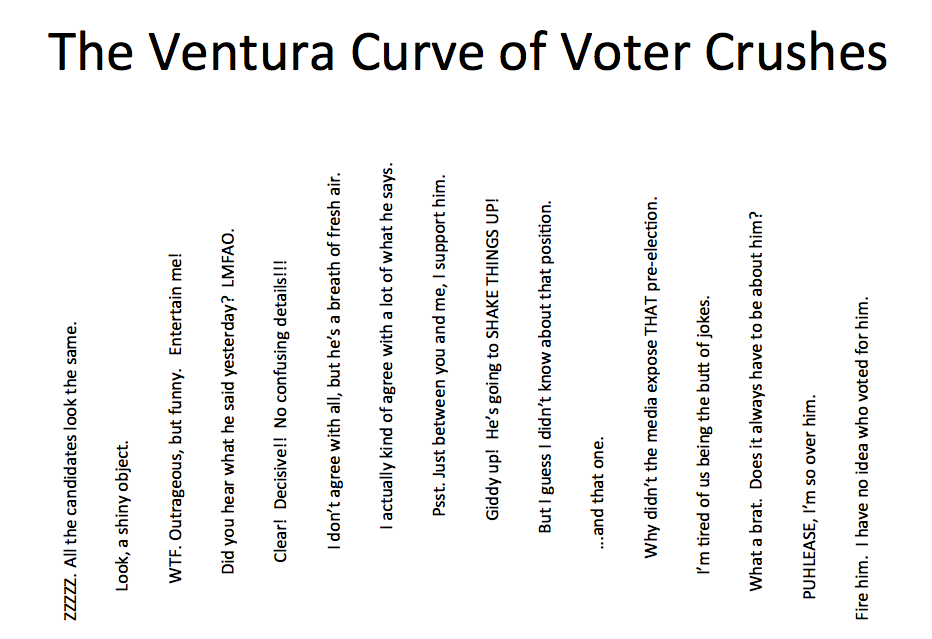

With the Trump Bump in full swing, we Minnesotans have an obligation to explain to our fellow Americans how these political crushes work. Been there. Done that.

 Veteran Twin Cities political reporter Jim Ragsdale was smart, decent, savvy, warm, and oh-so witty. Pancreatic fucking cancer got him today at 64 years old, and I’m going to miss him like mad.
Veteran Twin Cities political reporter Jim Ragsdale was smart, decent, savvy, warm, and oh-so witty. Pancreatic fucking cancer got him today at 64 years old, and I’m going to miss him like mad.
Great musicians get their most heartfelt ovations when they come out to present one of their masterpieces as an encore. So, the best way I can think of to honor my pal Rags is to feature one of his many masterpieces as an encore:
Minnesota — broke, a little bloated, and now looking for a new love
By Jim Ragsdale
Updated: 05/20/2010 05:58:46 PM CDT
He goes on long trips without explanation. He comes home and criticizes my appearance, even as he pays greater attention to his own image. Where there once was fondness and love, now all I get is, ‘Your taxes are too high! You’re spending too much! You have to cut back!’
I hate to say it after seven wonderful years, but I, Minnesota, can avoid the truth no longer. My governor, Tim Pawlenty, is seeing someone else.
Am I the last to figure this out? My neighbors, particularly, Iowa, said he has been seen there often, giving their presidential voters the affection I once received. Bigshot pundits who are on the make for a new star delight when he trashes me. But I thought that was, you know, just business, and not really serious.
I admit I have problems. My taxes and spending are on the heavy side — although I’m not as bulky as he likes to say. But hey, I’m Minnesota. I think I carry the weight well. And he knew all this going in back in ’03, when all was kisses and hugs. Why is he dumping me now for slimmer, sexier states?
Sorry — my bitterness occasionally gets the best of me. Deep breaths — in, out. Now, let me give you the whole sad story.
Gov. Tim was born and raised in Minnesota. He has lived and studied and worked here his whole life and he seemed to really care about me. We both knew there were things he didn’t like. He’s “red” and I always go “blue” in presidential years. He’s a fiscal conservative and I have a long tradition of high taxes and generous services.
But he was so cute back when he became governor in 2003. He had a charming way of saying he would try to nudge me in his direction, understanding that I was Minnesota, after all, and would never be, say, Texas or Mississippi. And he did just that. He pushed and prodded and battled and got me shaped up pretty good.
He said he loved my forests and lakes and trees and blue skies, and he was very protective and passionate. Green — good heavens the man was green!
That’s why I loved him back then, despite our differences, and why voters put him back in office for a second term, beginning in 2007. We were pretty happy for a while longer, at least as far as I knew. I never failed to deliver the goods on walleye opener — how ’bout that 22-incher at Kabetogama on Saturday? — and I know he appreciated that.
Then, almost overnight, everything changed.
That bigshot John McCain put him on the V.P. shortlist in 2008, getting him around the nation to red-hot audiences. And right after that, Jan. 20, 2009, happened. A new president — a blue president — took office. Gov. Tim began talking more about national politics and about running for president himself.
He began wandering. First to Iowa. Then New Hampshire. The South. Even the West. States that were trimmer and more red-hot than me.
I saw it but I didn’t see it — know what I mean?
Those floozy states were filling his head with ideas about how great he is, how good-looking and smart and presidential. I couldn’t compete with that. I was broke and a little bloated — just trying to keep home and hearth together — and when he came back, I could tell he no longer had that gleam in his eye.
I’d display my woods and waters and he’d be on the cell-phone with someone in South Carolina. We’d run into our usual budget problems and all he do is scold me to reduce eligibility here, cut benefits there, slim down all over. “Stop snacking on Local Government Aid!” he’d say. “They’re just empty calories!
I am so tired of hearing that.I thought of hiring a private investigator. But then I saw the evidence in black and white, from Eastern pundits. They said the only way he can get love from them is to withdraw it from me. It’s right here in the Wall Street Journal — every time he calls me fat and ugly, he wins points with them.
And trust me, the verbal abuse makes it worse, because when I’m stressed, I tend to binge on the K-12 funding formula.
Well, I may be dowdy and past my prime. I will always suffer through seasonal cold and hot flashes. But I’m not ignorant. The last thing I need, in the middle of a severe bout of economic recession, is my governor trashing me.
So I hereby free him to transfer his affections to those red-state red-hots, those governor-grabbing gigolos, those low-tax lovergirls who have turned his head.
As for me, I’ll survive. I’m getting my budget balanced and I’m having some work done on the out-biennium. But like I said, I’m Minnesota. I’ll always have big bones.
There are a lot of fish in the political sea, of the blue and red and even purplish variety, who will be darn proud to be seen with me. I wish him well in his quest for national stardom. And I hereby issue this request for proposals: I’m looking for a new Gov to be my true love.
No one will ever do “politics on wry” quite like Jim Ragsdale. Rest in peace JImbo.
Loveland
In an increasingly interesting and competitive U.S. Senate campaign in South Dakota, former Republican U.S. Senator Larry Pressler, now running as an Independent, is consistently portrayed by the news reporters as a “moderate.”
It’s ludicrous to characterize Pressler as a “moderate.” After all, his most recent votes in the U.S. Senate were 100% against women, teachers, students, gays and workers, he has voted for cuts in Social Security and Medicare, and he stilll speaks out about wanting to cut those programs even more in the future.
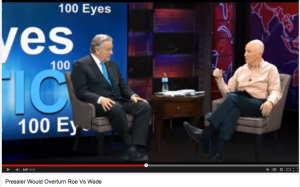 Pressler has also said in no uncertain terms during this current campaign that he would make abortion illegal.
Pressler has also said in no uncertain terms during this current campaign that he would make abortion illegal.
Not regulated, mind you. Not scaled back. Illegal. He would overturn the Roe v. Wade decision that has kept abortion a legal option since 1972.
After Pressler banned abortions, he would allow states to make abortion legal again if they choose, but we all know that many states would keep abortion illegal, and make millions of women into criminals and victims of botched back alley abortions.
Even in a red state like South Dakota, banning abortion is not a mainstream position. In the most recent polling I could find on this issue, a Sioux Falls Argus Leader survey, only 25% of South Dakotans say that abortion should be illegal.
Instead, an overwhelming 68% of South Dakotans want to keep abortion legal, either “legal and the decision to have an abortion should be made by the woman without government interference (34%),” or “legal but restricted to very specific circumstances, such as rape, incest or to save the life of the mother (34%).”
This idea that the news media mindlessly calls anyone who camouflages themselves with an “Independent” label a “moderate” shows just how shallow political reporting has gotten. Politicians who make abortion illegal, cut Social Security and Medicare and vote 100% against women, teachers gays, students and workers are hardly “moderate.” They are, by any reasonable definition, on the far right.
– Loveland
 MinnPost reporter Cyndy Brucato is breaking the blockbuster news that 2010 Independence Party gubernatorial candidate Tom Horner is, gasp, crossing party boundaries to support Republican gubernatorial candidate Jeff Johnson! The reporter breathlessly reports:
MinnPost reporter Cyndy Brucato is breaking the blockbuster news that 2010 Independence Party gubernatorial candidate Tom Horner is, gasp, crossing party boundaries to support Republican gubernatorial candidate Jeff Johnson! The reporter breathlessly reports:
Another leader in the Minnesota Independence Party is gravitating toward support of a Republican statewide candidate. Tom Horner, the Independence Party candidate for governor in 2010, is meeting this week with GOP candidate for governor Jeff Johnson to discuss joining his campaign.
Wow, if that happens, that does sound like huge news!
Unless you pay close attention to politics.
If you do pay close attention to politics, you know that Tom Horner is a long-time Republican staffer, supporter, consultant and pundit. Before Horner spent one year as a right-leaning Independence Party candidate for Governor, he was the head staffer for Republican U.S. Senator Dave Durenberger, has advocated for Republican candidates like Norm Coleman his entire adult life, has long counseled Republicans, and served for many years as the Republican voice on Minnesota Public Radio (MPR) and other news outlets.
In short, for decades Horner has been one of the most visible Republicans in Minnesota. Reporter Brucato is aware of this because she was a lead staffer for Republican Governor Arne Carlson and Norm Coleman. But she mentions none of Horner’s GOP bona fides in the article.
In other words, the real headline here is actually a wee bit less newsworthy. It’s more like:
GOP Activist Reveals That Veteran GOP Consultant Is Supporting A GOPer for Governor
Zzzzzzzzzzzz.
I like and respect Tom Horner a great deal. Though we disagree on many policy issues, Tom is intelligent, has integrity, and Mr. Johnson is lucky to have his policy and PR counsel. But let’s get real. This hardly qualifies as the blockbuster news the reporter makes it out to be.
I support MinnPost relying on a ex-staffers of politicians for opinion pieces. That’s an appropriate role for an ex-staffer. But they shouldn’t rely on ex-staffers from either party for news reporting like this, because their advocacy background naturally calls their objectivity into question.
While the lede was blown way out of proportion, I did find a few things intriguing about the article that left me hungry for deeper reporting. On taxes, Horner says:
“I wasn’t opposed to raising more revenue, but the way the governor went about it is not in the best long-term interest of Minnesota. Just adding fourth tier only reinforces a tax system that isn’t suited to a global market. Maybe we need more revenue but tilt the policy much more to tax consumption and more to reward investment.”
And on health care, Horner says:
“MnSure is where Republicans could play an effective role. It’s good that we’re expanding access and covering children and have a more robust marketplace. Now how do we control the underlying drivers of health care?”
The fact that Tea Party-backed Republican gubernatorial candidate Jeff Johnson may be bringing in a pro-tax, pro-Obamacare consultant for policy advice raises additional questions that were not posed by the reporter:
The answers to those questions would have been informative, and would have qualified as actual news.
– Loveland
 One of the more brazen political facelifts in recent memory is being attempted in South Dakota, where a ballot crowded with conservatives is causing conservative Senator Larry Pressler (R-SD, 1979-1997) to attempt to convince voters that he is now a moderate.
One of the more brazen political facelifts in recent memory is being attempted in South Dakota, where a ballot crowded with conservatives is causing conservative Senator Larry Pressler (R-SD, 1979-1997) to attempt to convince voters that he is now a moderate.
The former Republican U.S. Senator’s most recent television ad features this claim:
“I believe in taking the best ideas from both parties…”
That spin sells well with moderates. But Pressler’s claim will come as a huge surprise to non-conservative policy advocates, given that Pressler’s most recent voting record ratings show him rejecting almost all non-conservative ideas:
Source: Project Vote Smart
Voting records speak louder than ad claims, and this not the voting record of a moderate. This is not the voting record of someone who “takes the best ideas from both parties,” unless you believe conservatives have 99% of the best ideas, which of course makes you an ultra-conservative.
So why is long-time conservative Pressler trying to masquerade as a moderate in 2014?
Necessity. There are two other conservatives – Republican Mike Rounds and Tea Party-backed former Republican state legislator Gordon Howie — joining the historically conservative Pressler on the ballot. Pressler is running a pretty distant third place behind increasingly strong Democrat Rick Weiland and Rounds, and he apparently doesn’t like the mathematics associated with splitting the conservative vote three ways. So instead of running again as a conservative, Pressler is giving himself a moderate facelift, and hoping South Dakota moderates will somehow forget his conservative voting record in the U.S. Senate.
It’s understandable how South Dakota voters might forget the voting record of someone who has been out of office for almost two decades. It’s a little more difficult to understand how the South Dakota news media, many of whom covered Pressler and know all about his conservative voting record, could neglect to expose a facelift that would put Michael Jackson to shame.
– Loveland
You can’t simultaneously support deism and atheism, or capitalism and communism. Embracing one makes it logically impossible to simultaneously embrace the other. They are mutually exclusive. If a candidate came out and claimed to be for both of those ideological constructs at the same time, in an attempt to win support from supporters of each idea, they would be the laughing stock of American politics.
If you doubt that, imagine if you saw these headlines in today’s news:
Dayton Tells Congregation “I Support Atheistic Christianity”
McFadden Tells Business Group He Embraces “Capitalistic Communism”
The candidates would be laughed out of the race for taking such absurd positions.
I submit that the same should be true of simultaneously advocating to 1) outlaw denial of health coverage due to a pre-existing health condition and 2) make health insurance coverage optional. It’s defensible to embrace either of those two positions. But it’s not defensible to embrace those two approaches simultaneously.
Here’s why: If you outlaw the insurance companies’ enormously unpopular ability to deny coverage due to pre-existing conditions, but simultaneously make purchasing health insurance optional, millions of people would stay out of the insurance market until the moment they got sick or hurt. After all, why would anyone choose to pay high premiums for years to protect themselves against the expenses associated with treating an illness or injury when they know that the insurance company will be forced to pay the treatment expenses after they suffer from the ailment? And if millions of people refused to pay premiums until the moment they need insurance benefits, the insurance industry would very quickly need to dramatically jack up premiums, or go bankrupt.
There is broad consensus about this. The Georgetown University Center on Health Insurance, the Manhattan Institute, America’s Health Insurance Plans (AHIP), the Pacific Research Institute, the Manhattan Institute, The Concord Coalition, the Center on Budget and Policy Priorities, Families USA and many others have all said that a coverage mandate and preexisting condition reform have to be paired in order for the finances of health reform to work.
 Yet when GOP politicians endorse those two mutually exclusive positions, almost no political reporters note the absurdity of it. When reporters allow politicians to get away with simultaneously endorsing the part of Obamacare that outlaws pre-existing condition denials and opposing the part of Obamacare that mandates insurance coverage, they effectively allow those politicians to say something every bit as absurd as “I’m for capitalism, but I also support communism.”
Yet when GOP politicians endorse those two mutually exclusive positions, almost no political reporters note the absurdity of it. When reporters allow politicians to get away with simultaneously endorsing the part of Obamacare that outlaws pre-existing condition denials and opposing the part of Obamacare that mandates insurance coverage, they effectively allow those politicians to say something every bit as absurd as “I’m for capitalism, but I also support communism.”
For example Minnesota U.S. Senate candidate, and millionaire investment banker, Mike McFadden (R-Sunfish Lake) says:
Before we can make the kind of changes Americans deserve, we need to repeal the “Unaffordable Care Act” (which would repeal the coverage mandates)
…when we repeal and replace Obamacare, we need to make sure that those with pre-existing conditions actually have access to affordable insurance plans that cover their illnesses.
Any actuary will tell you that if McFadden and other GOP pols simultaneously enacted those two policies it would lead to a complete and utter meltdown of the nation’s health care finance system. But almost no political reporters will.
– Loveland
Note: This post was also featured on MinnPost’s Blog Cabin.
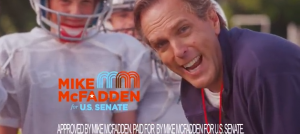 Saint Paul, Minn. — Minnesota U.S. Senate candidate Mike McFadden (R-Sunfish Lake) followed an earlier campaign television ad that ended with a child-inflicted injury to his groin with a new television ad that uses thinly veiled flatulence-based humor to further make his case for election to the U.S. Senate.
Saint Paul, Minn. — Minnesota U.S. Senate candidate Mike McFadden (R-Sunfish Lake) followed an earlier campaign television ad that ended with a child-inflicted injury to his groin with a new television ad that uses thinly veiled flatulence-based humor to further make his case for election to the U.S. Senate.
“We’re just trying to have some good clean fun, while making a very serious point about Al Franken’s big government, job-killing stuff,” said McFadden.
The ad opens with a fog rolling over a grainy black-and-white photo of a frowning Senator Al Franken. Ominous music drones throughout the spot, and two 10-year old boys on a playground chime in in a sign-songy tone.
Male adult announcer: “Something is very, very rotten in Washington.”
Male child actor #1: “Al Franken says the Iraq War and Great Recesssion are not his fault. But he who smelt it, dealt it.” (giggle)
Announcer: “Death panels. IRSgate. Benghazi. Al Franken wants to keep it silent. But we all know, they’re silent but DEADLY.”
Male child actor #2: “Whoever rebuts it, cuts it.” (giggle)
Mike McFadden: (Giggling and holding his nose ) “I’m Mike McFadden, and I declare it, so Al can no longer blare it.”
(McFadden then sits on whoopee cushion. McFadden and kids giggle in unison.)
Mike McFadden: “Oh no, not again, Al!”
The ad began running across Minnesota today. Like the groin ad, it was created by Washington-based Sophmoric Productions.
– Loveland
Note: This post is satire and the featured ad doesn’t exist, for now.
 There is a small minority that makes heartfelt arguments that the Earth is flat. Do they deserve half of the news coverage related to global geography? Two maps in every story?
There is a small minority that makes heartfelt arguments that the Earth is flat. Do they deserve half of the news coverage related to global geography? Two maps in every story?
Likewise, there is a small minority that argues humans with a certain skin pigmentation are superior to people with different pigmentation. Do they deserve half of the news coverage about race-related issues?
There also is a small minority that claims the moon landing was a hoax. Did they deserve half of the coverage of moon landings?
In all of these cases, giving minority viewpoints roughly half of the news coverage would have created a false impression that scientists are roughly evenly split about the shape of the planet, the inferiority of some skin colors and the feasibility of space travel. This kind of reporting would have been promoting things that nearly all scientists have proven to be false.
Which brings us to climate change. This week, the British Broadcasting Corporation (BBC) Trust recommended that BBC reporters no longer give equal time to the small minority of scientists who contend that climate change is not happening and/or is not impacted by human activity. A BBC Trust report recommends:
The Trust wishes to emphasise the importance of attempting to establish where the weight of scientific agreement may be found and make that clear to audiences. The BBC has a duty to reflect the weight of scientific agreement but it should also reflect the existence of critical views appropriately. Audiences should be able to understand from the context and clarity of the BBC’s output what weight to give to critical voices.
So, at a time when 97% of climate scientists have found that climate change is happening and is aggravated by human activities, half of the news coverage should not be dedicated to the viewpoint of the 3% of scientists who disagree.
Despite the increasingly lopsided scientific consensus on climate change, a 2013 report done by Media Matters found that half of print news outlets used a false balance approach to climate change reporting. On Fox News, 69 percent of guests cast doubt on the science. On CBS news, in reporting about a rigorous United Nations scientific report, climate change deniers were given more than six times their representation in the scientific community.
The BBC Trust is politely telling its reporters to knock it off. It is telling them to make sure their reporting reflects the reality of broad scientific consensus on climate change.
It’s time for Minnesota’s most thoughtful journalism leaders to follow suit. Star Tribune? MinnPost? Minnesota Public Radio?
– Loveland
 In recent years, it feels like the quantity of political reporting in daily newspapers has dropped off. Whether a function of smaller newsrooms, editors who believe the public wants less political coverage, editors who are gun shy about provocative political topics, or something else, there just seems to be less political coverage.
In recent years, it feels like the quantity of political reporting in daily newspapers has dropped off. Whether a function of smaller newsrooms, editors who believe the public wants less political coverage, editors who are gun shy about provocative political topics, or something else, there just seems to be less political coverage.
Political reporters do still cover the most predictable, scripted and formal of political events — candidacy filings and announcements, campaign finance filings, party endorsement events, and running mate announcements. For the most part, the public snores through all of this formulaic coverage of predictable events.
Case in point: Today’s Star Tribune carried a fairly in-depth article about Hennepin County Commissioner and gubernatorial candidate Jeff Johnson picking Guy I’ve Never Heard Of as his Lieutenant Governor running mate. In this article, we are earnestly briefed about the selection of someone who almost certainly won’t impact the outcome of the gubernatorial race, and almost certainly wouldn’t have substantive duties if he somehow beat the odds and actually got the job.
What is even better is that we can look forward to this kind of scintillating “candidate chooses running mate” coverage for each of the multitudes of candidates in the gubernatorial race. Spoiler alert: Each candidate will be picking someone brilliant who is “balancing their ticket” in some fashion.
Meanwhile, more important and interesting things go uncovered or undercovered.
These are shadowy areas where savvy, sleuthing political reporters could actually shed light. But when political operatives figure out that lying and hiding won’t get exposed, guess what, lying and hiding proliferates. When that happens, our democracy gets weaker.
I hope this isn’t an either/or issue. Maybe there still is enough capacity in newsrooms and column inches in newspapers to cover both the formulaic stories and the more probing stories. That would be ideal. But if there no longer is enough journalistic capacity for both types of coverage, our democracy needs the latter much more than it needs the former.
– Loveland
Okay, call me a rube, but my obscure little blog doesn’t get linked everyday in Tweets by national talking heads like Paul Begala. So when it happens, I have to take a moment to feel self-important, before I slink back to my dark corner of the world.
Yes, Paul (I call him “Paul” now) links to among the least unique posts I’ve ever penned. (And trust me, there is plenty of competition for that honor.) Yes, it is surely his first and last visit to WWP. Yes, this happened because of Rick Weiland’s great work, not mine.
But still, a sideways glance from Paul freakin’ Begala makes a backwater gadfly’s little heart go pitter-patter, and page views go through the roof.
I’m thinking I’m probably now on his holiday card list, right?
 Saint Paul, Minnesota — Minnesota U.S. Senate candidate Mike McFadden held a news conference today to announce that he would be announcing nothing.
Saint Paul, Minnesota — Minnesota U.S. Senate candidate Mike McFadden held a news conference today to announce that he would be announcing nothing.
“Minnesota is great, and I’ll do lots of great stuff in the Senate to make it even greater,” said McFadden, to roaring applause from his supporters. “Beyond that, I promise that I will not do wasteful ungreat things that keep Minnesota from becoming greater.”
Under questioning from reporters, the wealthy businessman running to replace U.S. Senator Al Franken refused to provide positions on the national policy issues that are debated in the U.S. Senate. For example, McFadden declined to state his position on the minimum wage, the Paycheck Fairness Act and a “personhood” anti-birth control measure.
MinnPost reporter Eric Black recently attempted to profile the stealth Senate candidate, but struggled to find anything to profile beyond the over $2 million the former businessman has raised from enthusiastic conservative donors. Black characterized the McFadden record like this:
I’m not sure what the record is for seeking a seat in the U.S. Senate without disclosing issue positions, but McFadden, who declared his candidacy nine months ago, may be giving it a run.
There is no “issues” section on his campaign website. He skipped the first three opportunities to debate his Republican opponents for the nomination. On Monday, he appeared at the fourth debate, but that one was closed to the press and public.
The McFadden campaign maintains that the candidate has taken many position stands, such as his desire to “name way more awesome things after Ronald Reagan” and “repeal and replace” the federal Affordable Care Act (ACA).
When pressed for details about what he would replace the ACA with, McFadden said that announcement would need to wait until he begins his six-year term in office.
“We will help, not hurt Americans,” McFadden explained.
The campaign did release a 12-page single spaced list of things McFadden would rename after Ronald Reagan.
When asked to name political role models McFadden listed Ronald Reagan, several Reagan impersonators and Chauncey Gardiner.
“By standing for no one, and Mike is appealing to everyone,” said Saul Loes, a conservative political consultant advising the McFadden campaign. “He just might be the most brilliant politician of our generation, if he exists, which we are neither confirming nor denying.”
Note: This post is satire.
The reporting on Obamacare public opinion research has been consistently shallow, as I’ve noted for years. Despite the many simplistic “Public Opposes Obamacare” stories and punditifications, a deeper dive into the polls shows that an overwhelming majority of Americans want to either keep the Affordable Care Act (ACA) as is, or improve it.
The latest Kaiser Family Health Foundation Tracking Poll, which was fielded prior to this week’s positive publicity about ACA insurance exchanges targets being met, finds that this trend is continuing. Even after a pre-deadline deluge of anti-Obamacare advertising, Americans still oppose repealing the Affordable Care Act, by a huge 29% to 59% margin. Independent voters, who will be so important in the upcoming mid-term elections, also overwhelmingly oppose the GOP’s repeal calls, by a 32% to 52% margin.
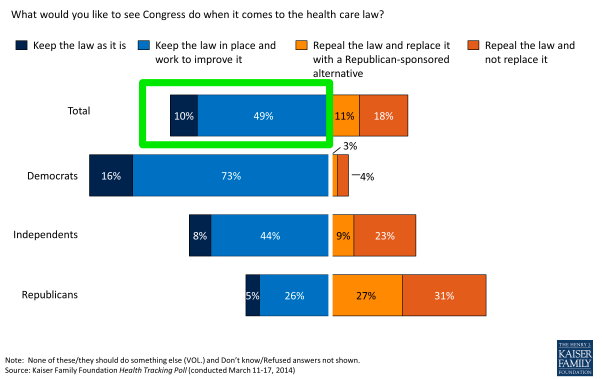 So, nervous DFL congressional candidates, improvements to the ACA — a better exhange website, a more robust exchange call center, more exchange “navigators,” stronger enrollment incentives for young adults, and/or a public insurance option — would be welcomed by voters. But let your Republican opponents blather on about “repeal and replace” all they want, because it simply is not selling.
So, nervous DFL congressional candidates, improvements to the ACA — a better exhange website, a more robust exchange call center, more exchange “navigators,” stronger enrollment incentives for young adults, and/or a public insurance option — would be welcomed by voters. But let your Republican opponents blather on about “repeal and replace” all they want, because it simply is not selling.
– Loveland
Note: This post was featured in Politics in Minnesota’s Best of the Blogs.
Two recent Star Tribune headlines brought good news and bad news to Minnesota DFLers about their top-of-the-ticket candidates, Governor Mark Dayton and U.S. Senator Al Franken.
Dayton approval rating at its highest
Franken remains a divisive figure
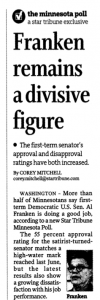 Wow, that must mean that Dayton’s poll numbers are dwarfing poor Al Franken’s, right?
Wow, that must mean that Dayton’s poll numbers are dwarfing poor Al Franken’s, right?
Nope. The actual Minnesota Poll findings told a completely different story than the Star Tribune’s headlines.
A similar number of Minnesotans approved of the jobs Dayton and Franken are doing, 58% and 55% respectively. About the same number of Minnesotans have a favorable attitude of Dayton and Franken, 36% and 38% respectively.
Both DFL candidates are looking relatively strong at this very early stage of the campaign season. Both candidates’ approval ratings are above the 50% mark, which is often considered a key benchmark for incumbents.
Franken’s 55% approval rating would be the envy of many other Democratic Senate incumbents around the nation, such as Alaska Senator Mark Begich (41% approve), Louisiana Senator Mary Landrieu (40% approve), North Carolina Senator Kay Hagan (36% approve), and Arkansas Senator Mark Prior (37% approve). Likewise, Dayton’s 58% approval rating is higher than 19 other gubernatorial incumbents facing races in 2014.
It’s true that Senator Franken has extremely high approval ratings among DFLers (97% approve) and extremely low approval ratings among Republicans(15% approve), hence the “divisive figure” headline. Dayton’s DFL approvers outnumbered his Republican approvers by a massive 4-to-1 margin, but the partisan gap for Dayton was not as large as the partisan gap for Franken.
That kind of large partisan divide is something you see in most political surveys these days. It is a relevant subplot, but its hardly the most important finding to feature in the front page headline.
In the age of information overload, headlines matter, more than ever. Headlines are the only thing that many busy news browsers see. Browsers assume that headlines about a survey feature the most important “bottom line” finding of the survey. The Star Tribune is a very good newspaper, but this was not the Star Tribune at it’s finest.
– Loveland
 After writing a letter-to-the-editor to a weekly newspaper complaining about MNSure rates, Jennifer Slater of Mabel, Minnesota was used by Republican operatives as a national poster child in their anti-Affordable Care Act crusade.
After writing a letter-to-the-editor to a weekly newspaper complaining about MNSure rates, Jennifer Slater of Mabel, Minnesota was used by Republican operatives as a national poster child in their anti-Affordable Care Act crusade.
In late November, the following Slafter accusation was all the rage in the national media and conservative blogosphere.
“All we ever heard about Obamacare is that it would lower our deductibles and premiums,” said Jennifer Slafter, 40 of Mabel, Minn. “That’s just not what’s happened.”
The exchange’s Blue Cross Blue Shield plan was $1,087 a month with a $6,000 deductible, while a Medica plan was $877 a month with a $12,700 deductible. Both are steeper than their current plan.
Conservatives ate this up. Type the first few words of that quote into Google, and you’ll see it appearing about 10,400 times in news publications such as CNNMoney and conservative blogs. Slafter was everywhere.
But it turns out that Slafter was a premature poster child. In paragraph 14 of a 16-paragraph Associated Press follow-up article, we recently learned something new about Slafter’s experience:
Since first going public, (Slafter) said the Fillmore County family found out it is likely eligible for more federal subsidies to help pay for coverage than initially thought. She now doesn’t anticipate the family losing money in the conversion next year.
If you search the first few words of that correction, you see that the article containing the correction appeared three times, buried at the end of a very long article. As far as I can tell, the correction article does not appear in any of the publications that ran the original article reporting the false claim.
Slafter doesn’t seem to have political motives. She just was confused by a confusing system and she was sincerely concerned. It can happen to anyone, and it’s not her fault that she was used as a political pawn by cynical operatives.
Though Slafter’s much publicized assertion that she would be paying more now seems to be false, she still finds the system too complex and worries about being able to pay the deductibles. I feel her pain on both fronts, though it should be noted that nothing her conservative promoters are offering would help on those two fronts, because they are offering nothing other than the badly broken status quo system. The best way to reduce complexity for consumers and remove deductibles would be a single payer payer system, which Slafter’s conservative promoters vehemently oppose.
Again, the false assertion gets over 10,000 placements in the conservative echo chamber, while the correction gets 3 hits in the 14th paragraph of the follow-up article. As Mark Twain said, “A lie can travel half way around the world while the truth is putting on its shoes.”
– Loveland
Note: This post was also republished on MinnPost.
Because journalists believe their audiences won’t tolerate nuance and ambiguity, they recruit political analysts who are certain, clear and decisive over those who are unsure, equivocal and astraddle. As a result, a kind of Punditry Darwinism plays out, where only the cocksure survive to deliver a steady stream of provocative instant analysis informed by little to no evidence.
MNsure’s Premature Death Proclamation
Take MNsure, Minnesota’s fledgling online tool for comparing and buying health insurance. When MNsure enrollment started slowly in its first month, Minnesota’s conservative talk radio pundits immediately declared it a train wreck, and this instant analysis has dominated the coverage to date.
MNsure may ultimately be a train wreck. After all, covering uninsured Americans has always been a very difficult task. But the immediate post-launch period is not a sensible time to make that judgment.
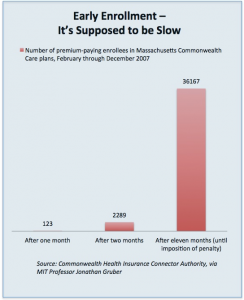 Historical data shows that consumers don’t tend to purchase health insurance the way they purchase Xbox 360s, lined up outside the store on launch day. Quite the opposite, most consumers purchase insurance at the very last moment possible. Purchasing an expensive service that you hope to never use is just not very satisfying, so most of us procrastinate.
Historical data shows that consumers don’t tend to purchase health insurance the way they purchase Xbox 360s, lined up outside the store on launch day. Quite the opposite, most consumers purchase insurance at the very last moment possible. Purchasing an expensive service that you hope to never use is just not very satisfying, so most of us procrastinate.
I’m not pulling this assertion out of my pundit posterior. In Massachusetts, just 123 early adapters stepped forward during their first month, and it didn’t get much better the second month. Instead, the big rush came just prior to the open enrollment deadline, when people face the prospect of a missed deadline and financial penalty.
It turns out that pulling the plug on the Massachusetts exchange when it only had 123 customers would not have been a wise decision for Commonwealth citizens, because Romneycare ultimately was worth the wait. After a few years of growing pains, Massachusetts’ Obamacare-like reforms increased the ranks of the insured to 97%. This puts states like Minnesota (91% insured) to shame, not to mention Chris Christie’s New Jersey (84% insured) or Ted Cruz’s Texas (76% insured).
Declaring a trainwreck just as a new train is lurching out of the depot is ludicrous. As much as it pains the cognoscenti, at this stage they need to be saying the four little words that might get them deleted out of reporters’ speed dials – “I don’t know yet.”
Daytonomics The Winner Already?
Then there is the Minnesota-Wiscoonsin border battle over state fiscal policy. In a New York Times commentary piece that has been widely shared via social media, a University of Minnesota professor and pundit recently declared that Minnesota Governor Mark Dayton’s Keynesian approach to state fiscal policy has been more successful than Wisconsin Governor Scott Walker’s austerity approach. His conclusion:
“The lesson from the upper Midwest is that rigid anti-tax dogma fails to deliver a convincing optimistic vision that widens economic opportunity and security.”
To his credit, the University of Minnesota professor does include caveats, such as “firm answers will require more time and more data.” But in the rush to be a clear and certain pundit who can get past the New York Times gatekeepers, the professor ultimately declared Daytononomics triumphant.
Here’s the problem with that: Daytonomics is very much in its infancy. Most of Governor Dayton’s most progressive policies are only now being put into effect, so the state of Minnesota’s economy can’t yet be attributed to the Daytonomics.
It’s true that Dayton has been in office for three years now. But, with the exception of Dayton’s expansion of Medicaid to 95,000 uninsured Minnesotans, the lion’s share of his progressive agenda — the improvements to education and other government services funded by tax increases on the wealthy — passed just a few months ago, after the 2011-2012 GOP-controlled Legislature was vanquished and could no longer block Dayton’s progressive policies.
Just as President Obama could not be fairly blamed for the 2008-2009 economic meltdown that played out before he could put his policies into place, Governor Dayton cannot be fairly celebrated for a better-than-average state economy when most of his progressive policies are only now being put into place. As a liberal, I hope Daytonomics bests Walkernomics, and expect it will. But it’s much too early to declare a winner.
As a public relations guy, I understand why the media wants commentators who give their audience instant gratification through instant analysis. But as a citizen, I worry about what all of this instant gratification does to us.
Psychologists find that children who can’t learn to delay gratification at an early age are much less likely to succeed in later life. The research indicates that the ability to delay gratification is absolutely key for success in school, marriages, friendships, health and jobs. The young kids who can’t learn to stop themselves from consuming marshmallows become the adults who can’t stop themselves from consuming the adult versions of marshmallows.
Given that research, what kind of democracy will we become if journalists, pundits and voters can’t learn to wait to make policy judgements until evidence is available to inform our debates?
– Loveland
Note: This post was also featured in MinnPost and Politics in Minnesota’s Best of the Blogs.
 The Minnesota DFL is in serious danger of losing ground in the 2014 elections. A primary reason is turnout – too many DFLers traditionally tend to stay home in years when there isn’t a high profile presidential race. But there are policy steps that the DFL can take during the 2014 to improve their chance of bucking the historic trend of Democratic setbacks in off-year elections.
The Minnesota DFL is in serious danger of losing ground in the 2014 elections. A primary reason is turnout – too many DFLers traditionally tend to stay home in years when there isn’t a high profile presidential race. But there are policy steps that the DFL can take during the 2014 to improve their chance of bucking the historic trend of Democratic setbacks in off-year elections.
INCREASE MINIMUM WAGE. Minnesota’s minimum wage is lower than the federal minimum wage, despite the fact that our overall per capita income is the 11th highest in the nation. Shameful. Six decades of data show the claims that increasing the minimum wage will increase unemployment are unfounded. Only one-quarter of Minnesotans support keeping the minimum wage this low. The DFL needs to show its electoral base, and moderate swing voters, that it is helping the most vulnerable workers make ends meet in a shaky economy. Petty DFL-on-DFL infighting killed a minimum wage increase last year, which was an embarrassment to a party that needs to show that it is mature enough to lead the state. That can’t happen again.
PASS A MODEST BONDING BILL. It’s a bonding year at the Legislature, so much of the session’s news coverage will be focused on the bonding bill. The DFL needs to show that it is a) making job-creating infrastructure investments but b) not breaking the bank, as Republicans will reflexively claim. Passing a smart bonding bill that costs about as much as average bonding bills in the Pawlenty and Carlson eras will show moderate voters that the DFL can get things done, and be trusted to control the purse strings another couple of years.
SPOTLIGHT GOP SUPPORT OF SHUTDOWNS. The federal government shutdown in 2013 and the Minnesota government shutdown in 2011 have left Republicans’ approval ratings at historic lows. Government shutdowns are a very toxic political issue for Republicans right now. But in politics, time heals all wounds. Therefore, the DFL needs to find new ways remind moderate voters that GOP legislators still are stubbornly refusing to swear off of their reckless government shutdown fetish. Maybe that means holding votes on legislation to require a supermajority vote for the enactment of shutdowns. Maybe that means requiring votes on legislation to dock the future pay for legislators who support shutdowns. Those votes can be used in the 2014 election to breathe new life into the Republicans most damaging political baggage from the 2011 and 2013 shutdown debacles.
GIVE THE REPUBLICANS THE MICROPHONE. The DFL legislators’ best electoral weapon remains Republican legislators. When it comes to appealing to swing voters, there are a group of Tea Party-supported GOP legislators who tend to be their own worst enemies. For instance, they compare food stamps to feeding wild animals and use the floor to drive their anti-gay obsessions. For a party that tends to keep digging their hole deeper, my advice to the DFL is to refrain from taking their shovel away. In fact, give them a backhoe. Don’t unnecessarily limit debates. Don’t interrupt. Give their radical bills hearings. All the while, keep the video recorder on, and share their extremeness via social media and the news media.
GET WORK DONE ON TIME. Voters don’t pay attention to 99% of the legislative machinations during sessions, but they do notice when legislative gridlock causes missed end-of-session deadlines. For swing voters, a missed deadline is an easy-to-understand symbol of immaturity, irresponsibility and incompetence. The father of the modern Democratic party, Franklin D. Roosevelt, advised “be sincere, be brief, be seated.” Modern DFLers should take FDR’s advice to heart. Imagine how pleasantly surprised swing voters would be to read a spring 2014 headline reading “DFL Leaders Quietly Finish Legislative Business A Day Early.” Easier said than done, I know, but it should not be underestimated how symbolically important making that deadline is to middle-of-the-road swing voters. An early adjournment should be a top priority for DFL leaders.
Most of the moderate swing voters who will determine the 2014 elections don’t pay close attention to legislative minutiae. They simply want state leaders who are passing a few constructive and popular bills, avoiding embarrassments, and keeping the government running on budget and on time. In the 2014 legislative session, that’s what DFL leaders should strive to deliver.
– Loveland
Note: This post was also featured by MinnPost’s Blog Cabin and Politics in Minnesota’s Best of the Blogs.
All four candidates running to succeed U.S. Representative Michele Bachmann in Minnesota’s 6th Congressional District are running on their intent to reverse budget deficits allegedly piled up during the Obama era. As Minnesota Public Radio’s (MPR) Brett Neely reports:
“So far, there’s little in the way of policy differences that separates the four candidates. They’re all sticking with the national GOP’s message about what ails Washington.
GOP candidate Rhonda Sivarajah: “The debt.”
GOP candidate Phil Krinkie: “Out of control spending.”
GOP candidate Tom Emmer: “Bureaucrats.”
GOP candidate John Pederson: “The deficit.”
The same can be said of the Republicans challenging Senator Al Franken, Governor Mark Dayton, and every other DFL incumbent. This should come as no surprise. “The national GOP message” is based on public opinion research, and polls show that an overwhelming number of Americans are concerned about the deficit. For instance, about 90 percent of Americans surveyed in a Bloomberg poll believed that the deficit is getting worse (62 percent) or not improving (28 percent), with only 6 percent saying that the deficit is decreasing.
In other words, the Republican message is selling with Americans. This bodes well for them in the 2014 mid-term elections.
The Myth of “Skyrocketing Deficits”
It’s worth noting that 90 percent of Americans are wrong about the state of the deficit. In an article titled “The Best Kept Secret In American Politics-Federal Budget Deficits Are Actually Shrinking!,” Forbes magazine notes:
Over the first four years of the Obama presidency, the deficit shrunk by a total of $300 billion dollars. The improvement in the deficit as measured against GDP is the direct result of the deficit falling to $845 billion for fiscal year 2013—a $300 billion improvement over the previous year. And the positive trend is projected to continue though the next fiscal year where the the annual budgetary deficit will fall again to $430 billion.
More recently, the deficit outlook has further stabilized. As CNN Money reported in May 2013:
By 2015, the deficit will fall to its lowest point of the next decade – 2.1% of GDP. And it will remain below 3% until 2019, at which point it will start to increase again. Deficits below 3% are considered sustainable because it means budget shortfalls are not growing faster than the economy.
Still, perception is reality in politics, so conservatives can be expected to milk this inaccurate “the deficit is skyrocketing” myth for all it is worth.
Courting “Progressative” Voters With Generalities
 At the same time, don’t look for conservative candidates to provide a detailed list of spending cuts they would make to reduce the deficit and debt more rapidly. Again, they read polls, so they know that Americans overwhelmingly oppose cutting the largest and fastest growing government programs. For instance, a Washington Post poll finds that 77% oppose “reducing Medicare benefits,” 82% oppose “reducing Social Security benefits,” and 51% oppose “reducing military spending.” Other polls show that opposition to cutting Medicare and Social Security is even more vehement among Americans over 50 years old, who are disproportionately likely to vote, particularly in non-presidential election years such as 2014.
At the same time, don’t look for conservative candidates to provide a detailed list of spending cuts they would make to reduce the deficit and debt more rapidly. Again, they read polls, so they know that Americans overwhelmingly oppose cutting the largest and fastest growing government programs. For instance, a Washington Post poll finds that 77% oppose “reducing Medicare benefits,” 82% oppose “reducing Social Security benefits,” and 51% oppose “reducing military spending.” Other polls show that opposition to cutting Medicare and Social Security is even more vehement among Americans over 50 years old, who are disproportionately likely to vote, particularly in non-presidential election years such as 2014.
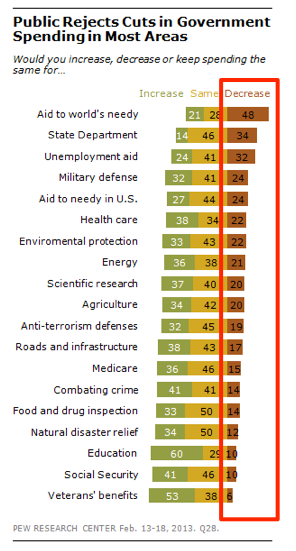 Beyond those enormous spending programs, a Pew poll also finds that a plurality of Americans believes that the funding levels for all 19 major government spending categories they tested should be either increased or maintained. Though conservatives have spent decades calling for cuts in “government spending,” Americans are steadfastly rejecting specific cuts in all parts of the federal budget.
Beyond those enormous spending programs, a Pew poll also finds that a plurality of Americans believes that the funding levels for all 19 major government spending categories they tested should be either increased or maintained. Though conservatives have spent decades calling for cuts in “government spending,” Americans are steadfastly rejecting specific cuts in all parts of the federal budget.
Therefore, the dilemma for contemporary politicians is this: Americans support the abstract notion of “cutting government spending,” which sometimes make us appear to be a conservative nation. At the same time, Americans oppose cutting any of the component parts of “government spending,” which makes us look like a remarkably progressive nation. Fiscally speaking, Americans are “progressatives,” conservative with our generalized rhetoric, but progressive with our program-by-program choices.
If the past is predictive of the future, most political reporters won’t press conservative candidates for a specific list of spending cuts to support their bluster. Instead, reporters will allow conservative candidates to rail in a generalized way about “cutting spending,” and in a false way about “skyrocketing deficits.” And as long as that rhetorical free ride is allowed to continue, the polls show that conservatives’ “cut government spending” mantra is a winning message.
-Loveland
Note: This post also was chosen for re-publication in Minnpost and as one of Politics in Minnesota’s Best of the Blogs.
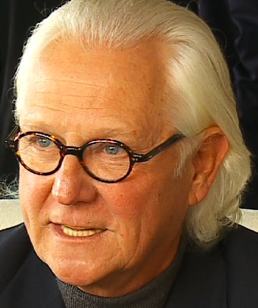 Bloomington, Minn., July 31, 2013 — A national hair style advocacy group called the Mullet Brotherhood announced today that it was organizing a drive to draft legendary WCCO-TV anchorman Don Shelby to run for Congress against Minnesota 3rd Congressional District Representative Erik Paulsen.
Bloomington, Minn., July 31, 2013 — A national hair style advocacy group called the Mullet Brotherhood announced today that it was organizing a drive to draft legendary WCCO-TV anchorman Don Shelby to run for Congress against Minnesota 3rd Congressional District Representative Erik Paulsen.
After retiring from the anchor desk, Shelby became a cause celebre in the mullet-American advocacy community when he let his hair down, the hind half of it. News reports that Shelby may run for Congress have caused a buzz among mullet activists anxious to see one of their own representing them in Washington.
“Former Governor Pawlenty had a chance become the first mulleted President, but unfortunately he dumped us for a Super PAC-approved cut,” said Floyd “Flow Joe” Joyner, President of the Mullet Brotherhood. “We’ve long admired Mr. Shelby’s silver cascade, and would dearly love to see that bad boy in the Capitol Building.”
Joyner admitted that the road will be long for Shelby. Protesters outside the news conference mocked Shelby and the group with various forms of hate speech, such as hockey hair, ten ninety, helmet hair, coupe Longueuil, haircut o’ death, neckwarmer, shorty longback, the 10-90, the Kentucky waterfall, the bi-level, the faded glory, the Ben Franklin, the Missouri Compromise, the Louisiana Purchase, the Camaro crash helmut, the business cut (business in front, party in the back), the LPGA, the soccer flip, the convertible, the Tennessee top hat, the Canadian passport, the New Jersey neckwarmer, the Chattanooga choo choo, and the neck blanket and the Wisconsin waterfall.
“If that ‘Wisconsin waterfall’ label sticks, that could be the end for Shelby,” said Dr. Harold Cloister, political science professor at St. Thomas University. “I’d look for Shelby’s handlers to spin it as more of a Minnesota Mudflap.”
With the exception of a few short-lived fads, hind heavy hair has been slow to be accepted in contemporary mainstream society. Though fossil records indicate that homo sapiens with primitive mullets have walked the Earth for at least 130,000 years, it was 2001 before the word “mullet” even appeared in dictionaries. Mullet activists see a Shelby candidacy as a historic opportunity to normalize the oppressed mulleted minority.
“We did have Governor Ventura in the State Capitol a few years back, but to be honest there is a rather ugly debate within our community about whether a skullet should be considered to be in the mullet family,” said Joyner. “Naturally, we value all forms of unbridled neck hair, but many feel that crown-based flow is a necessary element of the art form. But dandy Don’s ape drape, dude, we all get goose bumps about that mofo.”
Joyner announced the launch of a Draft Shelby website www.DonsDo4u.com. Along with a draft petition, the site also is selling “Don’s Do 4U” trucker’s hats, with a faux silver mullet flowing from the back.
Mr. Shelby refused to comment for this story. However, in previous news reports he has indicated that he has not yet ruled out becoming “a terrible congressman.”
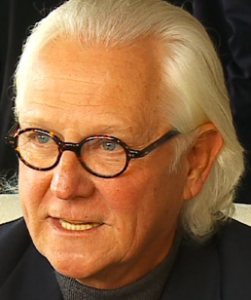 Do not, repeat, do not believe the “Don Shelby Mulling a Run for Congress” hype. Political reporters, bored with their jobs in the dog days of a non-election year, desperately want Shelby to run against the ever-bland Erik Paulsen. But it’s not going to happen.
Do not, repeat, do not believe the “Don Shelby Mulling a Run for Congress” hype. Political reporters, bored with their jobs in the dog days of a non-election year, desperately want Shelby to run against the ever-bland Erik Paulsen. But it’s not going to happen.
Anchors like Shelby need to be the center of attention, with a battery of cameras forever trained on their every move. Being in a body of 435 egomaniacs leaves one obscure. Our local version of The Donald does not do obscure.
Anchors need to be in control, with entire newsroom staffs at their beck-and-call. Being the most junior member in a seniority bound institution leaves one a pawn. King Don does not play the pawn.
Anchors need to feel above-the-fray of distasteful partisan politics, forever avoiding even a hint of controversy. But in Congress one is forced off the fence to vote on the most contentious issues of the day, and one’s hair gets mussed in the ensuing scuffles. And above all else, Dandy Don does not do mussed hair.
If Shelby runs for Congress, it will be because he is in denial about these realities, and denial is certainly a possibility for the humility-challenged amongst us. Shelby adores the current attention from political reporters, but he does not appear to be a stupid man. There is no way he will give up his elder statesman role on WCCO-TV and the rubber chicken circuit for the rough and tumble of partisan politics. He does seem to sincerely care about environmental issues, but not as much as he cares about preserving his local image as a legendary newsman.
– Loveland
Note: This post was also featured as a Best of the Blogs by Politics in Minnesota.
 I suppose it’s a cliché to point out that politicians speak in clichés. Their wall-to-wall use of bromides to mask deeper political truths has made political news conferences and speeches a rhetorical wasteland. Everyone can finish the sentences of the politician speaking:
I suppose it’s a cliché to point out that politicians speak in clichés. Their wall-to-wall use of bromides to mask deeper political truths has made political news conferences and speeches a rhetorical wasteland. Everyone can finish the sentences of the politician speaking:
“We must grow the _______.”
“We must invest in the _____.”
“Our greatest natural resource is our ______.”
“Economy,” “future” and “people/children,” right? No wonder the masses only perk up for scandals. They spice up an utterly predictable political discourse.
 To cut through the cliches and learn what politicians really think, what if we snuck a little amobarbital — sometimes used as a “truth serum” to obtain information from those who are unable or unwilling to tell the truth — into the water bottles at the podium of State Capitol news conferences? The first sentence or two would be the predictable, carefully focus-grouped political clichés. But then, bam, it’s amobarital time, baby!
To cut through the cliches and learn what politicians really think, what if we snuck a little amobarbital — sometimes used as a “truth serum” to obtain information from those who are unable or unwilling to tell the truth — into the water bottles at the podium of State Capitol news conferences? The first sentence or two would be the predictable, carefully focus-grouped political clichés. But then, bam, it’s amobarital time, baby!
“It’s time for the Legislature to do what ordinary Minnesota families do when they encounter difficult financial times. Mom and dad gather around the kitchen table, they thoughtfully review their household finances, and they have tough conversations about how they could cut the family budget to make ends meet.
(Amobarital kicks in)
But then most of those dads and moms say “screw it” and run up their high interest credit cards instead. After all, that’s why the Federal Reserve reports that consumer debt is at an all time high of $2.75 TRILLION. So whatever the Legislature does, it should not, I repeat, NOT act like those ordinary Minnesota moms and dads grappling with their financial future at the good old kitchen table.”
For the record, State Capitol Police Force, I understand that drugging elected officials would be an ill-advised and felonious act that I am not seriously contemplating or encouraging. But a boy can dream, can’t he?
– Loveland